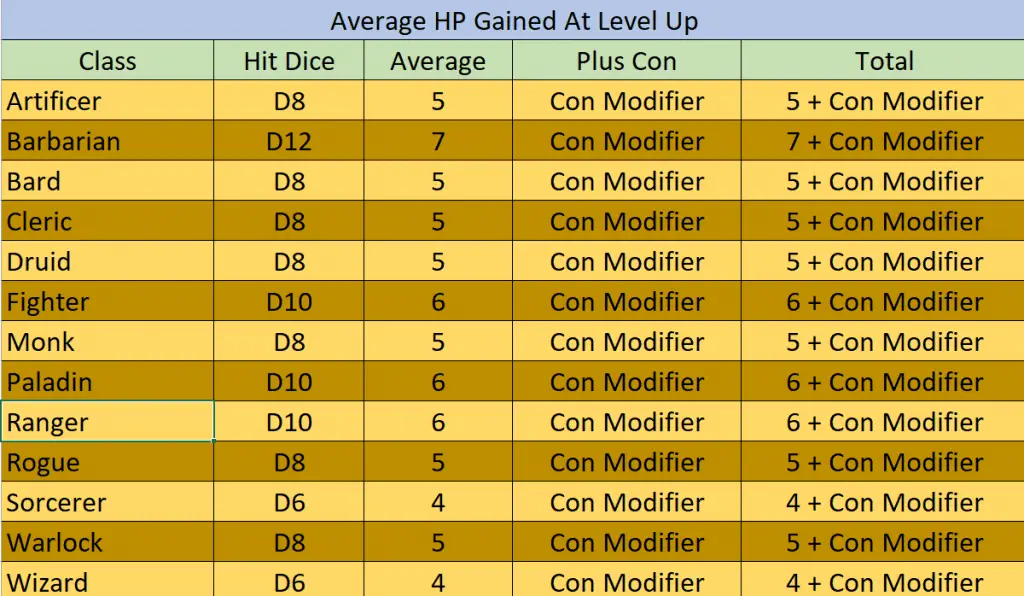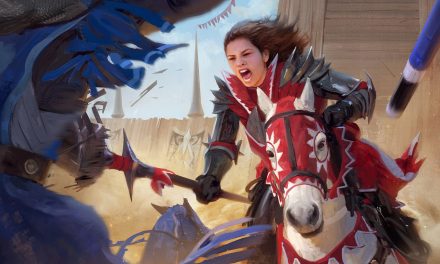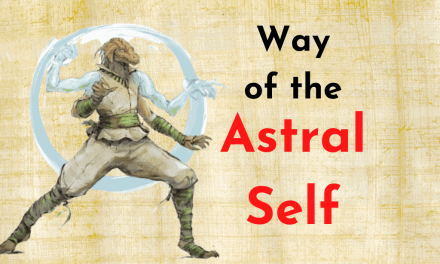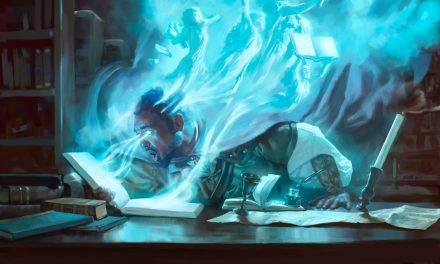Whether you’re leveling up after fighting a few monsters or hundreds, it’s always exciting!
But new players may find it a bit confusing.
It can seem like a lot, but this guide will help you make more sense of leveling up your character as you continue your adventure!
So let’s dive in and look at exactly what happens when you level up in D&D 5e!
Increasing Your HP When Leveling Up in 5e
Gaining a level gives you an extra Hit Die. These are used when regaining HP during a rest and for increasing your HP when leveling up.
What type of Hit Die you gain is determined by your class.
- Wizards and Sorcerers get a d6
- Artificers, Bards, Clerics, Druids, Monks, Rogues, and Warlocks get a d8.
- Fighters, Paladins, and Rangers get a d10
- Barbarians get the largest with a d12
Roll the die appropriate for your class.
Take that number, add your Constitution modifier and add the total to your maximum HP!
What if I Roll a 1 on my Hit Die Roll?
So, rolling a 1 is a definite possibility when rolling your Hit Die.
It’s an underwhelming feeling like ordering steak and getting liver.
I have yet to meet a Dungeon Master that won’t let you re-roll 1s when you’re leveling up.
Of course, that makes 2 the new underwhelming result, but at least it’s a little better?
You win some, you lose some, right?
Use Average Hit Die Rolls!
If you’d like to skip the potential for disappointment in your Hit Die rolls altogether, your group may use the Average Roll for their Hit Dice.
If your group uses this, you lose the potential to gain your maximum possible Hit Points, but you also don’t have to worry about gaining only the minimum amount!
Because the average is rounded up, this table will show you how much HP your character gains when using Average Rolls for Hit Dice.

New Class Abilities
When you level up, you’ll want to take a look at your class’s chart in the Players Handbook to see what you gain.
Each level, you will gain new bonuses, abilities, features, and spell options depending on your class.
For casters, these charts show them their new available spell slots and number of cantrips known in addition to class features. So they should be extra sure to do some research on what spells they want to learn or prepare!
Class Charts can be found in the Players Handbook as follows:
- Barbarian, Page 47
- Bard, Page 53
- Cleric, Page 57
- Druid, Page 65
- Fighter, Page 71
- Monk, Page 77
- Paladin, Page 83
- Rogue, Page 95
- Sorcerer, Page 100
- Warlock, Page 106
- Wizard, Page 113
Meanwhile, the Artificer’s Class Chart can be found on page 10 of Tasha’s Cauldron of Everything.
Proficiency Bonus Increase
At levels 5, 9, 13, and 17, your character will also get a bump in their Proficiency Bonus.
It may not seem like much up front, but the proficiency bonus is used for many important actions that your character may take.
This bump translates to bonuses for attacks with weapons with which you are proficient. It also factors into increasing your spell save DC, saving throws with certain abilities, and checks for skills in which you are proficient.
One bonus goes a long way!
Ability Score Increases When Leveling Up in 5e
Every class gets the option of an Ability Score Increase at levels 4, 8, 12, 16, and 19. The only exception to this is the Fighter who gets extra increases at levels 6 and 14.
So what is an Ability Score Increase?
Upon hitting the appropriate level, your character gets two +1 bonuses that they can apply to any of their six Ability Scores.
They may choose to put both of these towards a single Ability Score for a +2 bonus or they may choose to give two ability scores a +1 bump.
We’ve already covered Ability Scores, how they work, and what they mean in another article, so definitely check that out for more explanation!
The Effect of Increasing Constitution When Leveling Up
So what if you use your Ability Score Increase to increase your Constitution score and increase your Constitution Modifier?
If your Constitution Modifier increases as a result of an Ability Score Increase, your hit point maximum increases by 1 for every level that you have attained so far.
For example, Kronus the Sorcerer reaches level 8 and decides to increase his Ability Scores. He has a charisma of 19 and a Constitution of 13, so he puts a +1 in both scores to even them out. This raises his Constitution Ability Score to 14 which means he now has a +2 Constitution Modifier.
Because of this, Kronus’s maximum Hit Points increase by 8 for being 8th level.
Feats
Instead of taking an Ability Score Increase, you may instead choose to take a feat.
These are awesome abilities that help to specialize your character with all kinds of bonuses depending on what feats you choose.
Some feats take more precedence than others depending on your character’s class and how you’re building them. A character that specializes in ranged combat, for example, may find it more important to pick up a feat like Sharpshooter instead of buffing their Ability Scores.
Generally speaking, it’s typically best to focus on getting your primary Ability Score to its max of 20 before taking feats. But it’s entirely up to you! Some feats, like Sharpshooter or Great Weapon Master, are so good that they can totally be worth taking as soon as possible.
Multiclassing
If your Dungeon Master allows for Multiclassing in your game, you don’t exclusively have to continue adding levels in your starting class.
We’ll cover Multiclassing in more detail later, but we’ll lay out the basics for now.
Multiclassing allows your character to dip into other classes to gain their abilities. There is no shortage of builds available by taking advantage of Multiclassing rules!
Your Bard may find themselves commonly getting the jump on enemies and wanting to take some levels in Rogue to get extra damage from Sneak Attack.
You might be playing a Paladin who finds the dormant arcane power in their blood waking up as they take a level in Sorcerer.
When leveling up, choose if you would like to add a level in your current class or another one that you are able to multiclass into.
You will use this new class’s hit die when determining how much HP you gain for leveling up.
Conclusion – Leveling Up in D&D 5e
Not so scary, right?
D&D 5e does a great job at making each level feel like an achievement. Whether you’re gaining new spells, combat maneuvers, or class features, it’s hard not to get excited to show off your character’s new abilities!
As always, let me know in the comments if you have any other questions about leveling up!









